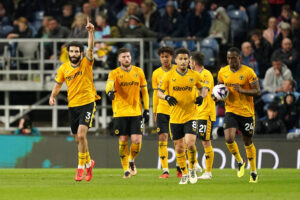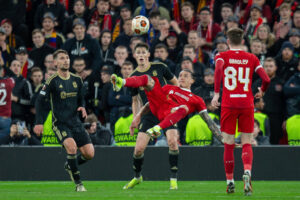The Celtic nations of the British and Irish Isles – Scotland, Wales, Northern Ireland and the Republic of Ireland – usually prefer to defeat the English (for most of them, their former imperial master) on the sporting field, but when they are forced to face each other it still creates a unique occasion.
The Five Finest All-Celtic Clashes in International Football
In effect, matches between them are, as Chris Coleman put it this week ahead of Wales’s World Cup qualifying clash with the Republic of Ireland, a “derby”, and as every true football fan knows derby matches are gloriously unpredictable. So, ahead of that match between Wales and Eire, here are the five finest all-Celtic clashes in international football.
WALES 1, NORTHERN IRELAND 0 (Euro 2016 Last 16, 25 June 2016)
The match itself may not have been a classic (far from it, in fact) but it was nevertheless historic, as it was the first time that two sides from the British and Irish Isles had met in a major tournament (a World Cup or European Championship). There was also a pleasing symmetry to the meeting, as Wales and Northern Ireland had both last appeared at the same major tournament 58 years earlier – the 1958 World Cup (which, of course, was Wales’s last major tournament appearance prior to Euro 2016).
At that World Cup in Sweden, the only major tournament that all four home nations have qualified for, Wales and Northern Ireland had upstaged their supposed superiors, England and Scotland, as they reached the quarter-finals while England and Scotland crashed out in the first round. Indeed, Wales might have gone even further had they not lost John Charles (arguably the greatest all-round footballer ever, as he could play at centre-back and centre-forward equally brilliantly) to injury before playing Brazil in the last eight.
The Euro 2016 first-round knockout match featured a standout performance from Gareth Bale, probably Wales’s greatest player since Charles (even if he cannot match Charles’s all-round footballing ability). Having lost their first “derby” of the tournament to England in the group stage, Wales rallied superbly to beat Russia and win the group, before facing a Northern Ireland side who had scraped into the last 16 after just one win and two narrow defeats in their group (a statistic that was cited by many as the ultimate indictment of the expansion of the Euros from 16 to 24 teams).
Although Bale did not actually score the winning goal himself, he virtually did, in that his superb left-wing dribble and low cross compelled Gareth McAuley to turn the ball into his own net before a Welsh attacker did. As Northern Ireland returned home to what was arguably an undeserved heroes’ welcome, Wales ended up reaching the semi-final, where Bale’s Real Madrid team-mate, Ronaldo, reminded him who exactly the main man at the Santiago Bernabeu was, by scoring the opening goal in a 2-0 win and leading Portugal to the final.
SCOTLAND 0, REPUBLIC OF IRELAND 1 (Euro 1988 qualifier, 18 February 1987)
This was the match that really marked the beginning of the superb run of results by the Republic of Ireland under the management of Jack Charlton, during which they qualified for two World Cups (Italia ’90 and USA ’94) and one European Championship (Euro ’88).
For many years before this match, Ireland had possessed a good team, with the likes of Ronnie Whelan and Frank Stapleton all starring for top English clubs, and Liam Brady proving himself to be one of the greatest midfielders in the world in Italy’s Serie A, first with Juventus and then with Sampdoria and Inter Milan. However, for all their talent, Ireland had not yet reached a major finals.
They had gone close in the early 1980’s, when they narrowly missed out on the 1982 World Cup in Spain after failing to qualify from an extremely tough group that included Michel Platini’s France and a Belgium side that had reached the final of the 1980 European Championship. However, by the mid-1980’s, it seemed as if Ireland had reverted to their usual role of plucky losers, until Jack Charlton took over the national side and turned them not only into winners but giant-killers.
It is hard to believe now, given that Scotland have gone nearly 20 years since qualifying for a major tournament (the World Cup in France in 1998), but when they faced Ireland at home in 1987 they were probably the favourites, as they could boast quality and experience in the likes of Gordon Strachan and Brian McClair. But Charlton, who of course had won the World Cup as a player with England in 1966, instilled a steel into the Irish side that had been absent.
Charlton’s reign as Ireland manager, though successful, was not without controversy, principally because he ditched the languid left-foot genius of Brady for more hard-working midfielders like Andy Townsend and Paul McGrath. However, he repeatedly proved his genius as an international manager over the next decade, and it all began here, as Mark Lawrenson scored a late winner to defeat the Scots.
Ironically, however, it was the Scots themselves who secured Ireland’s qualification for their first major tournament by surprisingly winning their last match away to Bulgaria, thus allowing Ireland to qualify for Germany ’88. It was a rare example of Celtic co-operation on the football pitch.
WALES 0, SCOTLAND 2 (World Cup 1978 qualifier, 12 October 1977)
Having said above that Wales went 58 years without qualifying for a major tournament, I must add the caveat that they did reach the last eight of the 1976 European Championships. However, at a time when the European Championships was very much the poor relation of the World Cup, only the last four teams reached the so-called “finals” in Czechoslovakia and Wales lost a two-legged quarter-final against Yugoslavia. Nevertheless, the fact that Wales had reached the last eight of their continental championship demonstrates that by the mid-1970’s they had a fine team, with star players such as Leighton James and Joey Jones. Consequently, when they were drawn against Scotland in the qualifying group for Argentina ’78, they had every right to see the games between the two as a clash of footballing equals.
However, as every Welsh football fan knows all too well (and probably complained about until they finally reached another major tournament last year), Wales were harshly treated, if not actually cheated, in 1977.
After crowd trouble at their previous home qualifying game in Cardiff against Yugoslavia (the same team who had beaten them in Euro ’76), Wales chose to play their next qualifier against Scotland not in Wales at all but in Liverpool, at the home ground of Scotland’s star player, Kenny Dalglish. The decision was made on financial grounds by the Welsh FA, but they soon regretted it as Anfield became a little part of Glasgow for the day, with Wales’ supposed “home” match being watched mostly by Scottish fans.
As if that wasn’t bad enough, the real footballing crime came late in the game, when Scottish striker Joe Jordan handled the ball in the Welsh box but the referee wrongly gave Scotland a penalty, thinking that the defender marking Jordan, David Jones, was actually the offender. Scotland scored from the spot, Dalglish got another goal three minutes from the end and for a brief period the Scots, although they were fellow Celts, were more loathed in Wales than the English.
WALES 1, SCOTLAND 1 (World Cup 1986 qualifier, 10 September 1985)
When Wales were again drawn in the same qualifying group as Scotland for Mexico ’86, many Welsh fans (and a few of their older players) actively sought revenge for the events of 1977, when their justifiable sense of grievance had only been accentuated by pictures of Joe Jordan kissing his hand after winning Scotland their penalty despite handling the ball himself.
And Welsh fans were entitled to be optimistic, as their team of the mid-1980’s was even more impressive than the team of the mid-1970’s. The front two alone – Manchester United’s Mark Hughes and Liverpool’s Ian Rush, who formed the classic “big man, little man” pairing up front that was so beloved by British teams in the 1980’s – was enough to alarm most teams, but there were other fine players, such as the Everton duo of centre-back Kevin Radcliffe and goalkeeper Neville Southall, who had led Everton to the old First Division title earlier that year.
However, the match was all but forgotten in the wake of the tragic events that followed it. Scotland got the draw that would ultimately take them to Mexico, but in the process they lost their greatest-ever manager, Jock Stein.
Stein, the creator of the legendary “Lisbon Lions”, the Celtic team who became the first British winners of the European Cup in 1967, fell ill near the end of the game, suffering what would eventually be diagnosed as a heart attack, and died soon afterwards. Thus were Scotland robbed of the opportunity of their greatest-ever manager leading the side in Mexico, when a team boasting the talents of Dalglish, Hansen and Souness might finally have made the knock-out stage of a World Cup, but for the loss of the man who had led them to the World Cup in the first place.
NORTHERN IRELAND 1, REPUBLIC OF IRELAND 1 (World Cup 1994 qualifier, 17 November 1993)
The indigenous Irish sports of Gaelic football and hurling both have “All-Ireland Championships”, in which teams from all 32 counties on the island of Ireland, including the six from Northern Ireland, compete against each other. However, this match was “the All-Ireland football championship” and it was incredibly hard-fought, making it perhaps the most memorable of the all-Celtic clashes on the football field over the years. (I hasten to add that there are many in Northern Ireland, especially on the Unionist side, who would baulk at being labelled “Celtic”, rather than “Anglo-Saxon”, but for the purposes of this article I am classifying Northern Ireland as one of the Celtic footballing nations.)
Five years before the Good Friday Agreement that finally brought at least limited peace to Northern Ireland, this was a heavyweight, bad-blooded clash that proved the Republic had definitively overtaken Northern Ireland, who had qualified for two World Cups in the 1980’s, as the finest football team in the island of Ireland.
The match was Billy Bingham’s last as Northern Ireland manager. A playing hero of the Northern Ireland side that had done so well at the 1958 World Cup, he actually achieved little in his first period in charge of the national side, between 1967 and 1971, probably because it was his first real managerial job after retiring from playing. When he was given a second chance to take charge of his country in 1980, he made the most of it, leading Northern Ireland to two successive World Cup finals and almost reaching Euro ’84 in France after beating the mighty West Germany (as they were then) home and away.
However, by 1993, Bingham had lost most of his great players of the 1980’s, such as Pat Jennings and Sammy McIlroy, and Northern Ireland were already out of contention for USA ’94 by the time they faced the Republic in the final qualifying game.
In true Celtic style, the fact that they themselves had nothing to play for only intensified Northern Ireland’s desire to deny the Republic of Ireland the chance to reach the World Cup finals in America. They actually went ahead, knowing that a win would knock out their southern neighbours, but a late equaliser by the otherwise utterly unheralded Alan McLoughlin got the Republic the point they needed to qualify. They finished just ahead of Denmark who, despite being European Champions at the time, could not get the point in Spain that they required.
The real irony is that, in retrospect, that night in Belfast can be seen as the end, or at least the beginning of the end, of the international managerial careers of both Billy Bingham and Jack Charlton. Bingham retired soon after the game, and although Charlton remained manager of the Republic for another two years, he and the world had already seen the best of his team. Although they shocked Italy by winning their opening group game at the 1994 World Cup, they eventually limped out of the tournament, defeated by Mexico in the last 16 in searing heat that effectively ended the international careers of a truly golden generation of players.
And the prospects for tonight’s match?
Tonight’s all-Celtic clash in Dublin between the Republic of Ireland and Wales will have to go some to match the magnitude or majesty of the games described above. As even this brief history of all-Celtic footballing clashes demonstrates, facing a local rival in an international arena makes for thrilling viewing, even if the football on display is not always of the highest quality.
Of course, in Gareth Bale, Wales boast a player of the very highest quality, but even he will struggle to match the whirling Irish dervishes who will come at him as if he were an Englishman, intent on denying him the time and space to weave his Real Madrid magic.
Whatever the result, though, it promises to be another fascinating chapter in the history of all-Celtic international games, a series that has already thrown up fatal heart attacks, contentious hand-balls and fist-kisses. Ultimately, perhaps, the Celts may not need England, as they are quite capable of battling it out with each other.
Main Photo:






